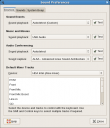At various recent conferences I have been asked if I think there is any hope for free software video codecs. Outside the core linux community the amount of people who even know that Theora exists is still quite small. That said and while it still is a big canvas to bleach, I do think open source video codecs have a mainstream future. At least most Linux companies are providing Theora copies of their promotional videos now, which it wasn’t that long ago they didn’t. We are still a bit raw on the tools side though, and while Pitivi is making good strides forward, its still isn’t ready for production use. One great piece of news on the Theora side of things is that Red Hat has Monty working on improving Theora further to improve video quality and get the magic 1.0 release of libtheora out. Check out this write up by Monty to get the details.
Dirac is also making strong strides forward and version 0.9.0 of libschrodinger, which got released today, will feel like a great leap forward for the causal tester. Most noticeable is that David Schleef tweaked the default parameters of the encoder to produce even nice looking images when transcoding high definition clips. This means that even if the tons of parameters you can set on the encoder is ancient Greek for you you can still play with it and create good looking video’s.
David also spent a lot of time for this release allowing you to set a specific bitrate for the encoded file, a feature a know a lot of users have wanted. That said the bitrate specification for Dirac is still not finished so any files produced with this version are not likely to keep working as development continues. But at least you can play with it now and get an idea of what Dirac will be able to do in the near future.
And of course on the horizon we do have the mp3 and mpeg2 patents ticking down towards expiration within the next 2-3 years, making these extremely common codecs free.


